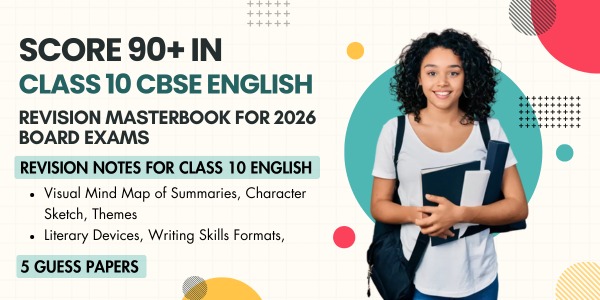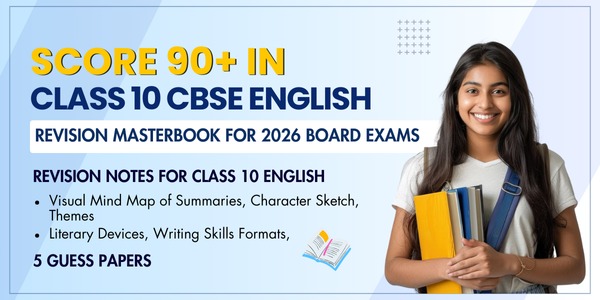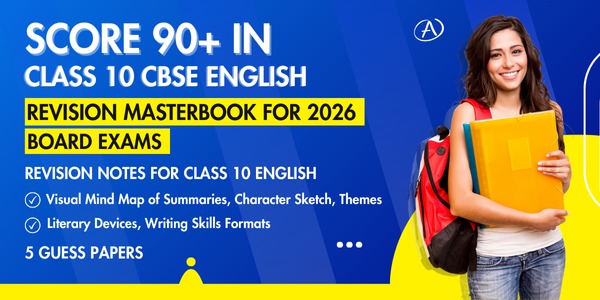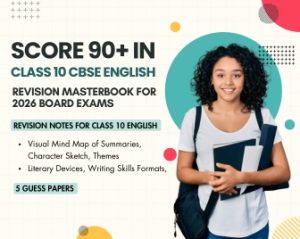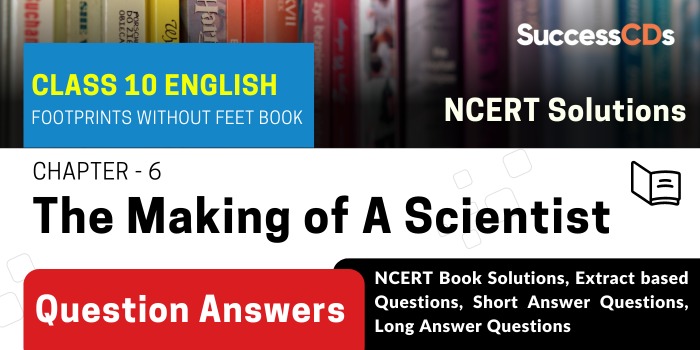
CBSE Class 10 English Chapter 6 The Making of a Scientist Question Answers (Important) from Footprints without Feet Book
Class 10 English The Making of a Scientist Question Answers – Looking for The Making of a Scientist question answers (NCERT solutions) for CBSE Class 10 English Footprints Without Feet Book Chapter 6? Look no further! Our comprehensive compilation of important questions will help you brush up on your subject knowledge. Practising Class 10 English question answers can significantly improve your performance in the board exam. Our solutions provide a clear idea of how to write the answers effectively. Improve your chances of scoring high marks by exploring Chapter 6: The Making of a Scientist question answers now. The questions listed below are based on the latest CBSE exam pattern, wherein we have given NCERT solutions to the chapter’s extract based questions, short answer questions, and long answer questions.
Also, practising with different kinds of questions can help students learn new ways to solve problems that they may not have seen before. This can ultimately lead to a deeper understanding of the subject matter and better performance on exams.
- The Making of a Scientist NCERT Solutions
- The Making of a Scientist Extract based Questions
- The Making of a Scientist Short Answer Questions
- The Making of a Scientist Long Answer Questions
Related:
- Class 10 The Making of a Scientist Class 10 Summary, Explanation
- The Making of a Scientist Character Sketches
- The Making of a Scientist MCQs
- The Making of a Scientist Previous Years Question with Answers
The Making of a Scientist NCERT Solutions
Q1) How did a book become a turning point in Richard Ebright’s life?
Ans) After Richard had collected all the 25 species of butterflies that were found in his surroundings, he thought that it would be an end to butterfly collection when his mom bought him a book named ‘Travels of Monarch X’ which told him about how butterflies migrated to Central America. This book aroused an interest in him for exploring more of what was to come and started studying more about monarch butterflies.
Q2) How did his mother help him?
Ans) His mother played a turning role in the life of the scientist as she used to buy him telescopes, microscopes, cameras, mounting equipment and used to try to help him by getting him things to learn in the evening when he used to be free. She also used to take him out on field trips and the book Travels of Monarch X was also bought by her. So we can say that the mother played a very important role in the making of what he was.
Q3) What lesson does Ebright learn when he does not win anything at a science fair?
Ans) He learnt that just by showing neat and clean simple slides won’t make him win anything but the actual experiment that he will perform will help him win the prize at any fair.
Q4) What experiments and projects does he then undertake?
Ans) He did an experiment to see the cause of the viral disease that kills nearly all the monarchs after a few years and also took up a project to prove that the viceroy butterflies copy monarchs to survive by behaving like them.
Q5) What are the qualities that go into the making of a scientist?
Ans) According to the chapter, there are three qualities that a person needs to have to be a scientist. Firstly, a first – rated mind, secondly, curiosity and thirdly, the will to win for the right reasons.
Class 10 English The Making of a Scientist Question Answers Lesson 6 – Extract Based Questions
Extract-based questions are of the multiple-choice variety, and students must select the correct option for each question by carefully reading the passage.
A. So he did, and did he ever! Beginning in kindergarten, Ebright collected butterflies with the same determination that has marked all his activities. He also collected rocks, fossils, and coins. He became an eager astronomer, too, sometimes star-gazing all night. From the first he had a driving curiosity along with a bright mind. He also had a mother who encouraged his interest in learning. She took him on trips, bought him telescopes, microscopes, cameras, mounting materials, and other equipment and helped him in many other ways. “I was his only companion until he started school,” his mother said. “After that I would bring home friends for him. But at night we just did things together. Richie was my whole life after his father died when Richie was in third grade.” She and her son spent almost every evening at the dining room table. “If he didn’t have things to do, I found work for him — not physical work, but learning things,” his mother said. “He liked it. He wanted to learn.”
1. What did Ebright collect as a child?
A. butterflies
B. fossils
C. coins
D. all of the above
Ans. D
2. The phrase ‘driving curiosity’ means the same as:
A. keen desire to obtain information
B. intelligence
C. apathy towards knowledge
D. concern about something
Ans. A
3. How did Ebright’s mother encourage him?
A. by taking him on trips
B. by bringing him gifts
C. by bringing home friends for him
D. Both A and C
Ans. D
4. Find a word from the extract which means the same as a scientist who studies planets, stars, and other celestial bodies.
A. Curiosity
B. Astronomers
C. Kindergarten
D. None of the above
Ans. B
5. Choose a word from the extract which means the same as “a school for very young children, aged from about 3 to 5”
A. School
B. Kindergarten
C. Companion
D. Grade
Ans. B
B. “I didn’t get any real results,” he said. “But I went ahead and showed that I had tried the experiment. This time I won.” The next year, his science fair project was testing the theory that viceroy butterflies copy monarchs. The theory was that viceroys look like monarchs because monarchs don’t taste good to birds. Viceroys, on the other hand, do taste good to birds. So, the more they look like monarchs, the less likely they are to become a bird’s dinner. Ebright’s project was to see whether, in fact, birds would eat monarchs. He found that a starling would not eat ordinary bird food. It would eat all the monarchs it could get.” (QB)
1. Choose the option listing Ebright’s qualities as depicted by the above extract.
I. persevering
II. visionary
III. determined
IV. liberal
V. conceited
A. I, II
B. III, V
C. I, III
D. IV, V
Ans. C
2. According to the dictionary, ‘fair’ as a noun, shows the following meanings.
Choose the option that lists the meaning similar to the usage to that in the extract.
A. A gathering of stalls and amusements for public entertainment.
B. A competitive exhibition showcasing products or ideas
C. A periodic gathering for the sale of goods.
D. An annual exhibition of livestock, agricultural products, etc., held by a town, county, or state.
Ans. B
3. Choose the option that is true for the two statements given about the information in the extract.
Statement 1. Starling feeds on viceroys.
Statement 2. Starling does not eat seeds and insects.
A. Both statements are clearly mentioned in the extract.
B. Statement 1 cannot be clearly inferred from the text and statement 2 is true.
C. Statement 1 is false and statement 2 cannot be clearly inferred from the extract.
D. Both statements need to be inferred from the given extract.
Ans. C
4. Choose the statements that are TRUE for the given extract contextually.
I. Ebright didn’t get any results for the experiment he conducted on butterflies.
II. Monarchs tasted awfully to the birds.
III. Ebright wanted to explore the possibility of monarchs getting eaten by birds.
V. He wanted to prove that viceroys are lookalikes of monarchs.
A. I, II
B. II, III
C. I, III
D. II, IV
Ans. B
5. Four friends bring their pets to a pet show. Choose the option that mentions the friend with a starling as a pet
Friend 1 has a turtle named Missy.
Friend 2 has a dragonfly named Majesty.
Friend 3 has a rabbit named Molly.
Friend 4 has a bird named Mitch.
A. Friend 1
B. Friend 2
C. Friend 3
D. Friend 4
Ans. D
C. When he saw those photos, Ebright didn’t shout, ‘Eureka!’ or even, ‘I’ve got it!’ But he believed that, along with his findings about insect hormones, the photos gave him the answer to one of biology’s puzzles: how the cell can ‘read’ the blueprint of its DNA. DNA is the substance in the nucleus of a cell that controls heredity. It determines the form and function of the cell. Thus, DNA is the blueprint for life. Ebright and his college room-mate, James R. Wong, worked all that night drawing pictures and constructing plastic models of molecules to show how it could happen. Together they later wrote the paper that explained the theory.
1. Choose the option that shows the picture of the type of task Ebright and Wong were engaged in, as
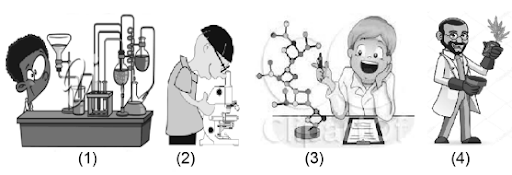
A. Option 1
B. Option 2
C. Option 3
D. Option 4
Ans. C
2. Ebright was perhaps expected to shout ‘Eureka!’ because he had _________
A. realised that he needed a partner to work with to finalise his findings
B. discovered something new and ‘Eureka!’ was a cry to announce it.
C. worked hard and was relieved at nearing the end of his project
D. given shape to the teachings of his teachers by choosing this field of science.
Ans. B
3. “Thus, DNA is the blueprint for life”, is another way of saying that the DNA contains a genetic __________.
A. experiment
B. ultimatum
C. takeaway
D. plan
Ans. D
4. Four newspapers published a headline about Ebright and Wong. Choose the option that published a factually correct headline, as per the extract.
| Newspaper 1 | Newspaper 2 | Newspaper 3 | Newspaper 4 |
| Wong denies
contributing to Ebright’s theory |
Ebright collaborates with room-mate Wong | Wong and Ebright
exaggerate their theory defy logic |
Ebright and
Wong’s theory proved wrong |
A. Newspaper 1
B. Newspaper 2
C. Newspaper 3
D. Newspaper 4
Ans. B
5. Compound words are those words which are formed by joining two separate words to create a new word with an entirely different meaning.
Choose the option that lists the compound words from the above extract.
I. determines II. blueprint III. nucleus IV. heredity V. room-mate
A. I, III
B. II, IV
C. I, IV
D. II, V
Ans. D
D. “Richard was competitive,” Mr Weiherer continued, “but not in a bad sense.” He explained, “Richard wasn’t interested in winning for winning’s sake or winning to get a prize. Rather, he was winning because he wanted to do the best job he could. For the right reasons, he wants to be the best.” And that is one of the ingredients in the making of a scientist. Start with a first-rate mind, add curiosity, and mix in the will to win for the right reasons. Ebright has these qualities. From the time the book, The Travels of Monarch X, opened the world of science to him, Richard Ebright has never lost his scientific curiosity.”
1. Richard was not competitive in a ‘bad sense’. This implies:
A. he wanted to give his best
B. his motive was not just to win
C. he did not want to win to get a prize
D. all of the above
Ans. D
2. According to Mr. Weiherer, the ingredients in the making of a scientist include:
A. a keen sense of inquisitiveness
B. the sole desire to win
C. to excel and win despite the odds
D. to be awarded for achievements
Ans. A
3. The statement that is NOT TRUE with respect to Ebright is:
A. He was competitive
B. He had the ingredients to become a scientist
C. He was only interested in winning
D. He won because he did the best job
Ans. C
4. ‘Richard Ebright has never lost his scientific curiosity’. This means:
A. he is satisfied with the work he does
B. he continues to be a keen learner
C. he has a first-rate mind
D. he has won all scientific competitions
Ans. B
5. The word ‘Competitive’ does not mean the same as:
A. to be better than others
B. to compete with others
C. to put in one’s best
D. to be ruthless while competing
Ans. D
Class 10 English The Making of a Scientist Short Question Answers (including questions from Previous Years Question Papers)
In this post we are also providing important short answer questions from the chapter The Making of a Scientist for CBSE Class 10 Boards in the coming session. These questions have been taken from previous years class 10 Board exams and the year is mentioned in the bracket along with the question.
Q1. The book, ‘The Travels of Monarch X’ ignited Richard’s curiosity in butterflies further. Do you think sometimes, people or things around us can act as catalysts to shape our lives? Explain how. [QB 2021]
Ans. Richard was bored with butterflies so his mother bought him a book “The travels of Monarch X” to read and enjoy. After reading this book, he studied the migration of butterflies and it opened the world of science to him. Truly, some people can be a source of inspiration to us because they play the role of catalyst to ignite our inner fire to reach our goal in life.
Q2. Richard’s mother was his companion and spent a lot of time with him. A parent should try to be a companion to a child. Justify. [QB 2021]
Ans. Yes, Richard’s mother was his true friend who helped him in all steps of life to become the world’s greatest scientist. It is necessary to be a friend to a child rather than be parents. As a friend, we can understand his problems better than he is facing because we have also gone through all this in our teenage years.
Q3. Suggest any two ways by which you feel scientific temperament can be developed in a child. [QB 2021]
Ans. Scientific temperament in a child is already there, the need is to cultivate scientific attitude in a child right from his childhood. His curiosity to know about strange things and will to learn new things should always be encouraged.
Q4. Do you think Richard’s mother was too indulgent when she bought him things like cameras, telescopes, microscopes? Give two reasons to support your answer. [QB 2021]
Ans. I don’t think that Richard’s mother was too indulgent when she bought him things like cameras, telescopes, etc. due to the following reasons
(i) She knew that Richard was highly curious and had a bright mind.
(ii) He wanted to learn things. Thus, Richard’s mother was justified in providing him the appropriate equipment to help him in the process.
Q5. Do you think we always need sophisticated instruments for all science experiments? Why/ Why not? [QB 2021]
Ans. No, not really. We have seen many times that great scientists have led to great discoveries and inventions using crude and raw instruments which have brought changes all over the world. So, it is not necessary that we need sophisticated instruments to create wonders
Q6. The will to win, for the right reasons, was a quality that Richard had. Do you think this quality alone can help us accomplish great feats? Why/ Why not? [QB 2021]
Ans. Of course, the will to win for the right reason can alone help us accomplish great feats. Determination, perseverance and the urge to learn something new even after failing at it, make us achieve the aim finally. Richard Ebright was a bright student in his school days, who always wanted to reach heights in his chosen field. Though many people through his journey of life helped him to achieve this extraordinary feat; but it was his own strong will and determination to sail through this hard journey all alone by himself and achieved him recognition and awards.
Q7. What other interests, besides science, did Richard Ebright pursue?
Ans. Richard Ebright was interested in science since childhood and had won many competitions but he also had many other interests. He was a passionate public speaker and was an important part of the Debating Society and Model United Nations Club. He was an enthusiastic photographer, especially interested in nature and scientific exhibits. He was also a canoeist and enjoyed the outdoors.
Q8. ‘Richard Ebright had all the ingredients required for the making of a scientist.’’ Elaborate [CBSE 2019]
Ans. Ebright was a keen observer and a hardworking child. He collected all 25 species of butterflies found around his hometown by the time he was in second grade. He raised a flock of butterflies and tagged them to help Dr. Fredrick to study their migration. In his high school, he led to the discovery of a new theory on the life of cells. With his perseverance, dedication and continuous hard work, he could determine that DNA is the blueprint for life. This discovery helped him to become a renowned scientist all over the world. Thus, Richard Ebright had all the ingredients required for the making of a scientist-analytical mind, providing ideas through experiment, a strong will to win and work for the benefits of others.
Q9. How did Ebright’s mother help him in becoming a scientist? [2020, 19]
Ans. Richard’s mother made Richard the centre of her life. She would buy microscopes, telescopes and books for him. She arranged trips for him and would also prepare difficult tasks for him. This helped him to learn a lot.
Q10. Why did Richard lose interest in tagging butterflies? [2020]
Ans. Richard raised thousands of butterflies, tagged them and released them to study their migration. But soon, he lost interest because only two of his tagged butterflies were returned to him and they had travelled only 75 miles.
Q11. How did Ebright’s mother help him in becoming a scientist? [CBSE 2019, 17, 14]
Ans. Ebright’s mother motivated him to learn. She was his only childhood friend and a companion. She used to take him on trips, buy scientific equipment like microscopes, telescopes, cameras, etc., and help him in many ways. She introduced him to Dr. Fredrick A. Urquhart of the University of Toronto, Canada. She found many interesting things for him to learn.
Q12. What lesson did Ebright learn when he could not win a prize at the science fair? [2016]
OR
What lesson did Ebright learn when in the seventh grade he entered a country science fair? [2020, 17]
Ans. When Ebright could not win a prize at the science fair, he learnt that winners do real experiments, they don’t simply display slides. Then he started conducting experiments. It was definitely a stepping stone towards his success. His competitive nature, his extra efforts and the will to win for the right reasons made him a successful scientist.
Q13. Which book did Ebright‘s mother get for him? How did it change his life? [CBSE 2017]
Ans. Ebright‘s mother got him a children‘s book titled ‘The Travels of Monarch X’. The book described how Monarch butterflies migrate to Central America. This opened the world of science to the young and enthused collector, Ebright.
Q14. How did Richard Ebright‘s mother help him? [CBSE 2017]
Ans. Richard Ebright was curious as well as bright. His mother played a pivotal role in encouraging his interest to learn. She took him on trips. She also brought him telescopes, microscopes, cameras, mounting materials as well as other equipment. She pushed him to learn more and explore the
environment around him.
Q15. Hobbies play a very important role in one’s life; elaborate this with reference to “The Making of a Scientist”. [2016]
Ans. It is true that hobbies play a very important role in one’s life. It was Richard Ebright’s hobbies that led him into the field of science. His hobbies were encouraged by his mother who always motivated him to learn new things. Further, it is because of his hobbies that he became a curious all-rounder, always ready to participate in things that he loved to do.
Q16. Richard Ebright displayed a well-rounded personality. Do you agree? Elucidate in the context of the given text. [CBSE 2016]
Ans. Richard Ebright displayed a well-rounded personality from his childhood. He not only collected butterflies but also collected rocks, fossils and coins. Science was not his only passion. He was an active member of his school’s debating club and Model United Nations Clubs. He was an enthusiastic canoeist and an all-round outdoor person with a keen interest in photography.. He was a champion, not because of his desire to win for the sake of winnings but for attempting to do his best. All of these qualities make him a well-rounded personality.
Q17. Why did Richard Ebright raise a flock of butterflies? [2014]
Ans. Richard Ebright as a child had developed a keen interest for collecting things like rocks, fossils, coins and butterflies. By the time he reached his second grade, he had collected all the twenty-five species of butterflies found in Pennsylvania. He also started tagging the Monarch’s at the behest of the author Dr. Tredrick A. Urgu Hart.
Q18. Mention any two of Ebright’s contributions to the world of science. [CBSE 2011]
Ans. The two contributions of Ebright to the world of science were –
- Ebright built a device that showed that the spots on monarch butterflies’ wings produce a hormone that is necessary for the growth of the butterfly.
- His other important contribution was his study of how cells read their DNA.
Q19. What did Mr. Kleiherer, his Social Studies teacher, tell us about Ebright?
Ans. Mr. Kleiherer said that Ebright would always put extra effort. Not only did he put in three or four hours at night engaging himself in debate research but would also do all his research with butterflies and deal with his other areas of interest. Mr. Kleiherer was of the opinion that Ebright was competitive in a true sense. He didn’t want to win just for the sake of winning but to accomplish his ambition and contribute the best that he could in this field. In fact, Mr. Kleiherer always said, “For the right reasons, he wants to be the best.”
Q20. Validate the importance of small, fun learning tasks towards successful careers, in the context of Richard Ebright in The Making of a Scientist.
Ans. The importance of small, fun learning tasks towards successful careers, in the context of Richard Ebright in the making of a scientist, can be validated by the following points:
- Humans typically study more when learning is enjoyable.
- It improves their capacity for learning, enables them to master new skills fast, and gives them hands-on experience.
So far, Richard Ebright from the lesson “The making of a scientist” can support the aforementioned points. He began gathering and breeding butterflies as a pastime, but after some time, he developed an interest in researching the gold spots and the secretion of butterflies.
Q21. The will to win, for the right reasons, was a quality that Richard had. Do you think this quality alone can help us accomplish great feats? Why/ Why not? (QB)
Ans. It is an important quality that is seen among winners. But, I feel, this quality alone cannot help us accomplish great feats. Besides the will to win, several other factors like family support, physical and mental well-being and awareness, financial status etc. do matter in making someone a winner. Richard was an average student in his school but his mother’s timely support and other favourable conditions worked positively to help him to become a successful scientist. No doubt once stepped onto the right path, he worked hard with determination and never looked back.
Class 10 The Making of a Scientist Long Answer Questions Lesson 6
Q1. Give a brief character sketch of Ebright‘s mother. [CBSE Delhi, 2020]
Ans. Richard H Ebright’s mother was a gentle and kind lady who encouraged and inspired Ebright’s interest in learning. It was she who laid the foundation of his success as a scientist. After her husband’s death, her son, who was studying in the third grade, became her life. She encouraged her son’s keen interest in learning. She understood that her son had a curious and bright mind. She recognised his son’s scientific temper, so she made sure that her son had everything that he needed. She took him on trips and bought him telescopes, microscopes, cameras, mounting material and all other equipment. She was his only companion before Richard started going to school. When Richard’s school started it was she who encouraged him to make friends. She would invite his friends to their house. She would sit with him at night. Even when Richard did not have any work to do, his mother made sure that she found something to engage her son. It was she who got him the book “The Travels of Monarch X” and opened the world of science for him. She knew that her son had a passion and did all things possible to fulfil them. This support, guidance, care and concern of Ebright’s mother made him into the prodigal and successful scientist.
Q2. How did Ebright use determination and perseverance to achieve his aim of becoming a scientist? [CBSE 2019]
Ans. Richard Ebright had been a curious child since he was in kindergarten. His curiosity prompted him to collect rocks, fossils, coins and butterflies. His mother’s encouragement and his bright mind also contributed to making him a successful scientist. His mother got him all that he needed to develop his scientific bent of mind. His response to Dr Fredrick A. Urquhart to collect butterflies for his research gave him an opportunity in his endeavours. Then in the seventh grade, he got a hint of what real science is when he entered a country science fair and lost. He realised that winners had tried to do real experiments, not simply made a neat display. Thereafter, Ebright worked sincerely on every science project he got every year in school. Then he stood first in a county fair that gave him entry into the international science and engineering fair where he won third place. He then went on to win the highest honours and graduated from Harvard. His High School research into the purpose of the spots on a monarch pupa eventually led him to his theory about cell life and DNA. He never lost his perseverance and determination and thus always kept on moving in life keeping all his failures aside and thus, he became a renowned scientist.
Q3. Dr Urquhart contributed significantly to Ebright’s growth as a scientist. Explain
Ans. Richard had become bored with collecting butterflies. His mother gave him a book about butterflies’ migration. With the book, Richard made contact with Dr. Urquhart. He was instructed by Dr. Urquhart to research butterfly migration patterns.
When he did not win any prize in the science fair in seventh grade, he again wrote to Dr Urquhart to guide him. The scientist gave him many suggestions for new experiments. Richard performed these experiments throughout his high school and won many prizes. Subsequently, inspired by Dr. Urquhart, he investigated the causes of brilliant spots on monarch pupae. A novel hormone was later found as a result of it. An important notion was furthered by the discovery of this novel hormone. The idea explained how DNA is interpreted by cells. Dr. Urquhart thus revealed himself to be his true mentor.
Q4. Ebright’s study of monarch pupas had a far reaching impact. Elaborate.
Ans. The brilliant patches on a monarch pupa had long been thought of by the scientific community as merely decorative. Dr. Urquhart, however, did not concur. Not Richard either. He began his research with a monarch pupa. With the aid of a buddy, he constructed a machine. This resulted in the hormone’s discovery. Richard provided evidence that the hormone was essential for the butterfly’s development. His discovery earned him a lot of accolades. It also sparked another significant investigation. He started researching how cells interpret their DNA. DNA, also known as the “blueprint of life,” is the genetic information carrier. His theory could find answers to many cancers and diseases.
Q5. Parents play a crucial role in the upbringing of their children. Critically examine the parents of Bholi and Ebright, highlighting their impact on their children’s lives.
Ans. Parents play the most crucial role in a child’s life. A lot of the child’s development depends on how he was nurtured in his childhood. Parents are his first teachers, providing comfort and security, which has a direct impact on the development of the child’s brain. Ebright’s mother played the role of a friend, philosopher and guide. She was his sole companion and fulfilled the vacuum created by the death of his father. She tirelessly assisted him in his research and provided everything necessary to enhance and widen his mental horizon. Consequently, Ebright grows up to be a renowned scientist.
Contrary to Ebright’s mother, Bholi’s parents detested her from the time of birth because of her gender. They had negative ideas about the education of a girl child, and Bholi was put into school more to fulfil their selfish requirements. As a result, Bholi grew up to be a timid child who would stammer much to her parent’s annoyance. In a nutshell, Bholi was a victim of the patriarchal mindset of her parents.
Q6. You have been requested to write a brief blog post for a Science blog for kids on the theme-‘Science is Real’. Based on your understanding of the chapter, write the blog highlighting how science pervades every aspect of our lives. You may begin like this: Scienceforkidsblogger.com
Monday, October 19, 2021
SCIENCE IS LIFE ………………………………………………………………………………………………………………………………………………………………………………………………………………………………………… [CBSE QB 2021]
Ans. Scienceforkidsblogger.com
Monday, October 19, 2021
SCIENCE IS LIFE
It’s true that the above line is telling us about the significance of science in our lives. It indeed is our life, the be all and end all of our existence on this very special planet mother earth. Many scientific discoveries and inventions have changed the course of our life, from a food gatherer man became a food producer; it’s all thanks to greatness of science. It has revolutionised the entire world around. No man is left free without his dependence on scientific inventions and discoveries. So, we can truly say ‘Science is life’.
Q7. Albert Einstein said, ‘The important thing is to never stop questioning.’ Richard was a genius who proved this quote true. Justify. [QB 2021]
Ans. Richard Ebright was a brilliant student. He always had an urge to discover something new. Albert Einstein’s quote ‘The important thing is to never stop questioning’ suits Ebright perfectly. Since childhood, Ebright was a curious child. He used to read a lot of books and research on several theories. When he lost in his first entry at the county science fair, he didn’t stop trying. He learned that to win, he had to do a real experiment and not just a display. Then he asked Dr. Urquhart about the ideas to work on insects to win the fair. Finally, he won the first prize in his second attempt. Later, he worked on Monarch pupa’s gold spots and how cells read their DNA. He never satisfied himself after accomplishing his task. Nor did he stop trying after failing at his attempt. He was a determined student who kept trying.
Q8. Imagine Richard wrote a letter to his mother when he was studying at Harvard University for motivating him and being a constant source of support throughout his growing up years. Write that letter of gratitude as Richard. You may begin like this:
Harvard University
Cambridge
Massachusetts
20 September 1981
Mrs. Ebright
Reading
Pennsylvania
It’s been long since I’ve written to you. ……………………………… [CBSE QB 2021]
Ans. Harvard University
Cambridge
Massachusetts
20 September 1981
Mrs. Ebright
Reading
Pennsylvania
Dear Mom,
It’s been long since I’ve written to you. I miss you a lot here. You have always been my pillar of strength and morale. I couldn’t imagine being a scientist without your unconditional support. I remember when my father passed away, I was in third grade, my world was shattered as he was my biggest support and my best friend. But the way you managed me with your love and support, I can never be thankful enough for that. You became my best friend, my teacher and my guardian angel. I will always be grateful to you. You have developed the enthusiasm of learning about butterflies in me since childhood. Today I am who I am only because of your hard work and guidance. I love you so much.
With Love,
Richard
Q9. Imagine you are Richard. You have been invited by Mr Weiherer to deliver a short address to the students at your erstwhile school. You have been asked to encourage them to take an interest in the study of Science and how research in Science can help the world. Write that short speech. (QB)
Ans. Good Morning young scientists ! As you people must be aware that science is essential in understanding the natural phenomena happening around us. Science gives us the ability to reason and to question instead of following orthodox theories and beliefs . You people may relate science to just a neat display of frog tissues. However you are wrong dear children! Science is all about conducting experiments, analysing the observations and getting to conclusive results. For example-I worked in the field of biological or life sciences specifically conducting experiments on different animals. I studied the eating habits of birds, golden spots on the wings of butterflies and cell theory. The beauty of science is that you never fail. You either win if you accomplish in getting the desired result or learn from your mistakes. I hope that you children would be quite intrigued regarding science and would be eager to learn new things.
Q10. Richard’s mother had been invited to a talk show after Richard’s graduation from Harvard with the highest honours. You attended that talk show. Write the most memorable thing she spoke about and what you think it reveals about her. (QB)
Ans. The talk show with Richard’s mother.
Host: Well, Ms Ebright, how do you feel about Richard’s homecoming with the greatest Honours from Harvard?
Mother: It feels really great! My son has brought honours to me and our country.
Host: Was he a special child or an average child?
Mother: He was absolutely an average child in his school. He used to observe things happening in nature very keenly and It helped him a lot. He kept himself busy researching whatever fascinated him.
Host: Do you want to give any parenting tips?
Mother: Keep your kids busy with constructive ideas and try to understand their talent at the initial stage itself.
Host: Do you see any change in Richard’s attitude now?
Mother: Oh yes, he is more sincere, more determined and more dedicated now.
Also See:
Class 10 English Syllabus
Character Sketches of Class 10 English
CBSE Class 10 English Lesson Explanation, Summary
CBSE Class 10 English Question Answers (Important)
CBSE Class 10 English MCQs
Class 10 English Complete Study Guide
Class 10 English First Flight book Prose word meanings
Class 10 English First Flight Poems word meaning
Class 10 English Footprints without Feet word meanings
List of Poetic Devices in Class 10 Poems (Poem-wise)
10 Important Poetic Devices for Class 10
